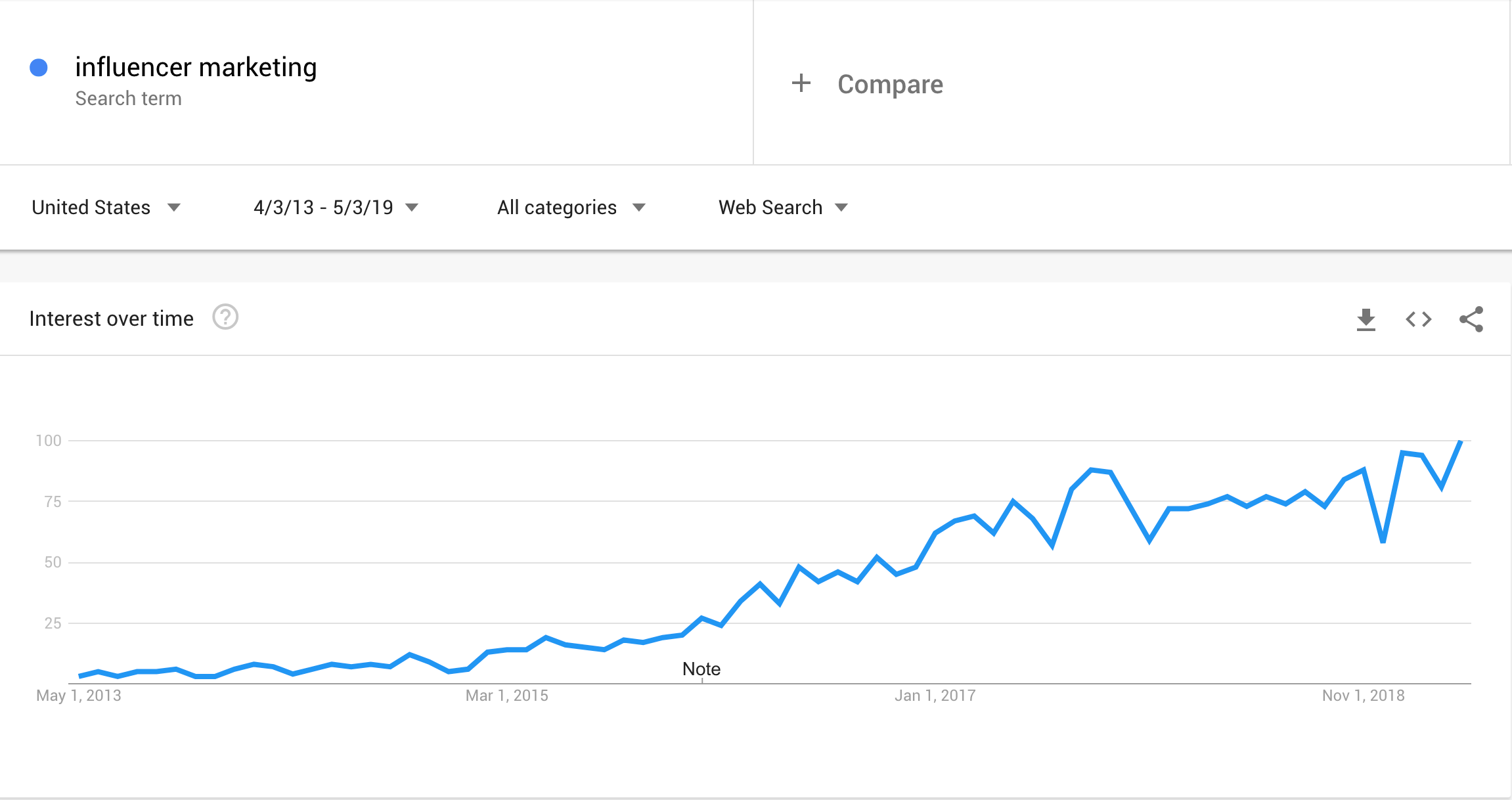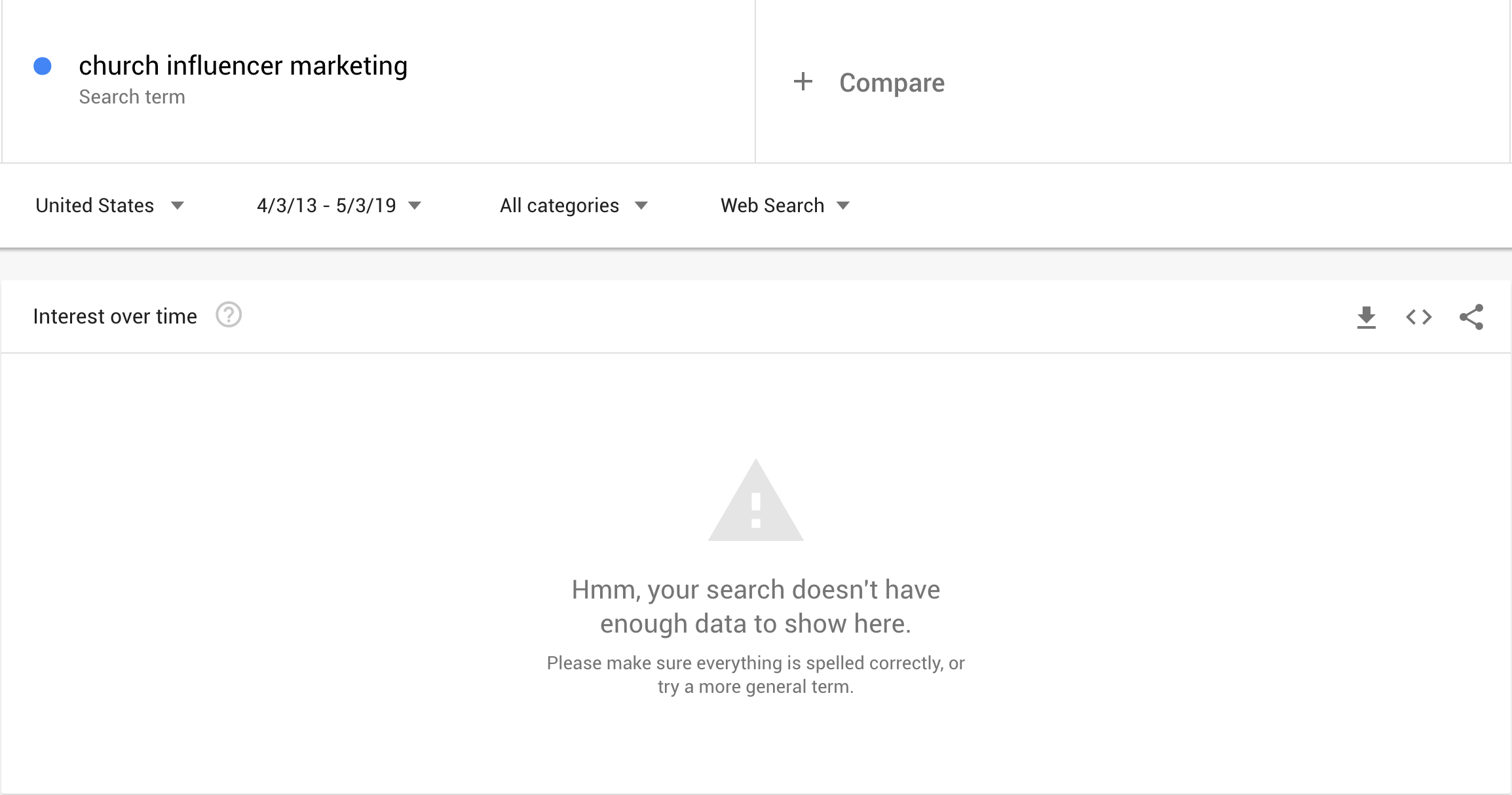Influencer marketing is one of the biggest marketing trends at the time of this article. However, it is virtually non-existent among churches. Yes some churches have influencers in their congregation and they have approached them to promote events such as Easter. But I haven’t met a church yet that was doing it at full scale and have never yet met a church that worked with an influencer network.
Why This Is All A Terrible Idea
There are a lot of great reasons for why churches aren’t working with influencers yet. For one, the cost is incredibly high at the moment. Personally, I think the state of influencer marketing as a whole is either in a bubble or still rapidly forming. For many influencers, the cost can be between $1000-$5000 per post! And it is hard to trust the metrics of an influencer who is financially incentivized to only show you the rosiest picture.
The second reason that churches are avoiding influencer marketing is lack of local targeting. An influencer’s followers could be anywhere, but the church’s primary audience is within a very limited distance from the actual church locations. Even larger multisite churches are still very localized. Paying a celebrity who attends your congregation to promote an event will mean that thousands or even hundreds of thousands of people around the world will find out what time your Easter service is. When running paid ads, you wouldn’t even consider targeting a national audience, but paying larger influencers would have that effect.
The third reason is authenticity. Paying a celebrity to talk about your church on instagram is going seem insincere and fake. That is definitely not a good look for a religion that is founded on the ideas of authentic relationships. Authenticity, being a good and natural fit, affects the ROI. If it feels like a genuine recommendation it will perform significantly better.
But What If…?
Despite knowing all of those reasons why influencer marketing doesn’t seem like a good fit for churches, I couldn’t get it out of my head. Here was a trend that is transforming marketing it is completely unavailable to churches. And despite all of those reasons, all I could think about was “what if”? And in thinking about that, three great reasons jumped out in favor of influencer marketing.
- Church influencer marketing is what we’ve been doing all along. But now we’re doing it online. Influencer marketing at its heart is just recommending something. Or to put it another way, it is evangelizing. “Hey! Here is this great thing that I just have to tell you about! It is the Gospel!” When we say “Influencer Marketing,” though, we are usually talking about asking people with a significant number of followers. They built up those followers by being active in a community and engaging with others. By providing helpful and quality content. All of these things are what the church is supposed to be doing! Both individually and corporately as a body. We invented influencer marketing. The world saw how effective it could be when it was actually done right and started hiring brand evangelists and influencers. While we sit inside our church walls and expect the neighbors to accidentally wander in.
- Influencer marketing is possibly the second and maybe even best digital evangelism method we have now. I’ve been on record before saying that SEO was the best digital evangelism tool available to churches. But I might have been wrong. A group of influencers can have an even greater impact in sharing the Gospel in your community with unreached people (more on this in a later article). While I still believe that SEO can have a greater reach, influencer marketing could have greater engagement and ROI. Which leads me to…
- It has a higher ROI than other digital channels. The reason that influencer marketing is taking off outside of the church is because it has a high return on investment. I realize that terms like “ROI” sound too marketing-ish and don’t reflect the fact that we are custodians of grace caring for immortal souls. So let’s just say that influencer marketing reaches more fertile ground for a greater harvest. Or maybe we could say that it is today’s version of casting your net on the other side of the boat. Either way, it leads to a greater number of people making eternal decisions.
For a long time, I thought about all of the reasons why churches couldn’t or shouldn’t do influencer marketing, and wrestled with these reasons that seemed like it could be effective if only someone could find the right influencers. That’s when I decided that the solution was not in the church looking to the world’s influencers but in the church creating their own influencers.
How To Create Your Own Church Influencer Network
My next question was how could I create my own influencer network that addresses all of the reasons why influencer marketing doesn’t work for churches, but still keeps all the reasons why it could be a great fit. How can we create an influencer network that is inexpensive, reaches a local audience, and is authentic? Here is how I am doing it and how you can do it to:
- Find The Most Active Online Communities In Your Area (Or Play To Your Church’s Strengths)
In our area (Nashville), there are 3 main industries. Music, surprisingly, isn’t really the biggest one. It is number 2. The biggest is actually healthcare. And the third biggest is what I’m calling mom blog industry. The mom blog industry as a whole is HUGE. Estimates have it at between a $2.9 billion industry and an $11 billion industry. Either way it is gigantic. But much of that industry is hyper competitive and made up of small blogs. Neil Patel addresses many of the complaints and competitive nature of the industry HERE. But in our community, I noticed several mom bloggers who worked hard to build followers, were active in their community, genuinely cared about their audience and their community, and were still struggling to make it as a side business.
Mom blogging is big all over the country, but you may live in an area that doesn’t have a very active mom blogging community. College towns fit this description, areas with older demographics, etc. But your community has something that makes it unique, maybe a local college, tourism, a particular industry, something that people talk about regularly. It may even be nearly invisible to natives because it is so ubiquitous. That is what you should target. I would actually recommend NOT taking the typical church approach and trying to be all things to all people. You’re not gifted in all areas, find the areas that you are gifted in and stick to that. Otherwise, this approach will be too shallow and broad to be very effective.
- Build A Better Solution By Helping Others
In our case with mom bloggers, there were several challenges faced that needed addressed. Typically mom bloggers struggle with constant content creation, getting links to their site, the type of content that pays (product recommendations, multi level marketing, etc) was off putting to their readers. And the type of content that was interesting to the reader didn’t pay.
I attempt to address all of these issues by creating a new mom site (Motherhood In Nashville). We invite moms from our church and moms from the community to contribute by writing an article, or if they like it, 1 or 2 articles a month. They write just the good stuff and no promoting anything but their own blog. No essential oils, no baby clothing boutiques, etc. But they can promote their own website, blog, or business in their bio and plug their own social media channels. This way they get to build links, write the good content that brings in readers, and still keep their main blog and source of income.
Our case is unique because I work for an agency. That means that I have the opportunity to build things out and benefit a lot of churches in our area. It also means that I can attract local nonprofit advertisers as well. So our writers will eventually get paid per article and paid for sponsored content on their social channels. They won’t make enough to live off of, but it should make it worth their time and fit into a #momlife schedule. For a local church doing this on their own, they don’t need multiple articles each day or even 60-100 influencers and writers. A smaller church (here defined as 250 or lower) could get by on 5-10 writer/influencer/volunteers. And weekly content vs multiple each day. - Equip, Empower, and Entrust
Most of our influencers were not professional influencers prior to this. And most of them weren’t that great at writing despite having their own blogs (please don’t tell them that, I love each and every one of them and I love reading their content). So that means that I spend most of my time on this project editing and helping the writers create high quality content for the site. BUT they are great at being authentic on their social channels! So when they are talking about a church event or signing up for MOPS, it is real and genuine and effective.
And many of them are becoming friends with each other through our network. You can organize meetups and writer/influencer events as a way to encourage and empower each other. It also has the effect of amplifying each other. When one posts about an event, another can share, comment, or like that post because she also is invested. They have gone from competing against each other’s mom blogs to empowering and amplifying each other. The network benefits each of them.
But this also means trusting in our influencers. They come up with the content. This is great for churches without a photography and video budget because you get new content with the whole deal, but it also gives them a huge amount of creative control. And in our case, not all of our writers are Christians. We have editorial control over what goes on the mom blog site, but they can do whatever they want on their own social channels. We have to be ok with that. If you are a church looking to do something similar, it will be hard not to treat your volunteers and influencers as employees. But I would advise against this. They would be posting whatever they want if they weren’t a part of your program, the difference is that they are now ALSO posting your content. There is a line that they can cross, and we see this with professional influencers losing sponsors for racist comments or other issues. But for many churches there will need to be a degree of leniency required that they aren’t used to. Think of this as reaching out directly into the community. You are evangelizing, don’t expect the people you are sharing the Gospel with to act as though they were already filled with the Holy Spirit. - Measure, Learn, Adapt
If you aren’t looking at the metrics of your communications efforts, you’re missing the boat. Stop and go check your Google Analytics and Facebook Insights right now. Learn them, understand what is happening, what is working, and what isn’t. Then make appropriate changes.
This is equally true with your influencer network. I’m learning something new every day. That means that I need to make changes almost every day. There have been several things that I learned that if I didn’t change would have doomed this whole project to failure. And it may still be doomed, but someone is going to take this idea and run with it, because they learned and adapted it to be the right fit at the right time.
Influencer marketing on the local level is completely different from the enterprise level and is still the wild west. Do you wish your church could have jumped on social media and digital marketing back in the early days before it became ubiquitous? Do you ever fantasize about what could have happened with a head start of 5 to 10 years? Now is your chance! Yes there are challenges, yes, the tools and resources that are easily available for social media and SEO simply aren’t there yet.
But all of that means that you get to be the pioneer and you get to make a huge difference in your community. For those of you in the church communications community that have that innovator itch, this is your chance! But be warned, while influencer marketing can be a perfect fit for churches of any size and any budget, the initial startup time and effort is fairly significant. It also requires volunteers and volunteer management. If you don’t have the time or volunteer management skills required then you may want to wait a few years or so for someone to invent automated platforms to make things easier.
Also, just as a side note, if you are reading this and can think of tweaks or adjustments that you would recommend, please let me know! I’ll be updating as we grow out this new idea. And if you live in a larger city and want to know more, I am considering building out our Nashville platform for other locations. As of now, Los Angeles is next on our list assuming things don’t totally bottom out here first.
Finally, this is all a big experiment. If you want to find out more, ask deeper questions, or just brainstorm your own influencer network contact me using the form below. Or if you want all the files and a copy of our site, I’ll sell a copy of everything to you for $1 (due to licensing with some of the plugins, I have to treat it as though I’m building a site for a client). I’m excited about the possibilities and I love discussing it with others who are also interested in finding out what happens when we look for new ways to share the greatest story!









